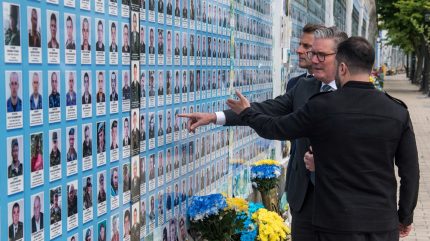UK trumpets support for Ukraine’s increasingly forgotten war

The UK is continuing to supply a war in Ukraine that is at risk of becoming yesterday’s conflict, as other international crises in Gaza and Syria, as well as domestic issues, dominate the news cycle.
Nearly three-and-a-half years have gone by since Russia’s large-scale invasion of its neighbour in February 2022, in a war that has claimed hundreds of thousands of lives.
Providing a rare update on its support to Ukraine, the UK government said on 21 July it had delivered over £150m ($202.3m) in air defence and artillery ammunition over the past two months.
In addition, another £550m was earmarked for Ukraine as funding for more drones, increasingly the most lethal battlefield capability, as well as contracts to “maintain and repair” UK weapons already provided.
The UK has given a vast range of its land inventory to Ukraine, including its entire 155mm AS90 artillery force – broken first by Army Technology – as well as Scimitar light tanks, Challenger 2 main battle tanks, Stormer anti-air systems, among other capabilities.
Not content with that, London has also developed new mobile air defence systems for Ukraine, even as its own armed forces continue to diminish in quantity and qualitative lethality.

The Ukraine assistance update provided by the UK government, once trumpeted, are less often publicised than earlier instances. It could be that, with all its previous donations, there is little now left to give, for fear of further undermining the country’s military.
In mid-July, UK Armed Forces Minister Luke Pollard said since 2024-25 the UK government had committed to providing Ukraine with £3bn of military support until 2030-31 or “for as long as needed”, according to a written parliamentary response.
“A further £1.5 billion of support is being provided in 2025 as part of the Extraordinary Revenue Acceleration (ERA) initiative. This takes our total support to Ukraine for this year to £4.5 billion, which is the greatest amount of support since Putin’s full-scale invasion began,” Pollard said.
In March, the UK Prime Minister announced a £1.6bn deal to provide more than five thousand air defence missiles for Ukraine.
Over the two-month timespan the UK government says it has been delivering ammunition to Ukraine, combat operations have continued unabated as Russia continues to grind metre-by-metre through the country.
As a metric of the intensity of combat, in the two months from 21 May to 21 July, Ukraine claims to have killed or wounded a total of 66,380 Russian military personnel, broadly in keeping with the 30,000+ monthly casualty rates. Ukraine’s own losses are a state secret, but potential comparable to that of Russia’s.
Is Ukraine at risk of becoming a forgotten war?
Far from UK shores, crises in the Middle East are gaining column inches and the public zeitgeist, as Israel continues its controversial operations in Gaza, while the new Syrian regime struggles to keep control of bloody sectarian clashes between the country’s Druze minority and Bedouin tribespeople.
Israel has also waded into the burgeoning Syrian unrest, bombing Damascus in mid-July, targeting the defence ministry of the Islamist-led administration of interim President Ahmed al-Sharaa.
At home, the UK has been rocked by dozens of protests against Israeli operations in Gaza, while the Palestine Action direct action group has been declared a terrorist organisation after causing damage to RAF transport aircraft at a military airbase.
In addition, the UK Ministry of Defence has been hit by accusations of a cover-up following the disclosure that it had placed a super-injunction on MPs and media alike following the leak of sensitive information regarding Afghan citizens seeking asylum in the wake of the calamitous Kabul airlift in 2021, as well as apparent naming of Special Forces and MI6 personnel.
Combined with an economy leaning towards recession, the UK government is struggling to form a compelling narrative for domestic consumption.

For Ukraine, the war never went away, as President Volodymyr Zelenskky called on 19 July for the pace of ceasefire negotiations to be increased.
“Everything must be done to achieve a ceasefire,” Zelenskyy said in its evening address.
A key problem is that Russian President Vladimir Putin appears disinterested in any such move, despite US President Donald Trump, for now, restarting some military equipment provision to Kyiv.
With backing from China, North Korea, Iran, and others, and alternative markets in Asia as Western countries cut their own supply of Russian energy, Moscow appears in a strong position to continue fighting, certainly until the expected winter entrenchment on both sides.
Ukraine meanwhile has no choice but the soldier on, absent the luxury of choosing to focus on something else.


